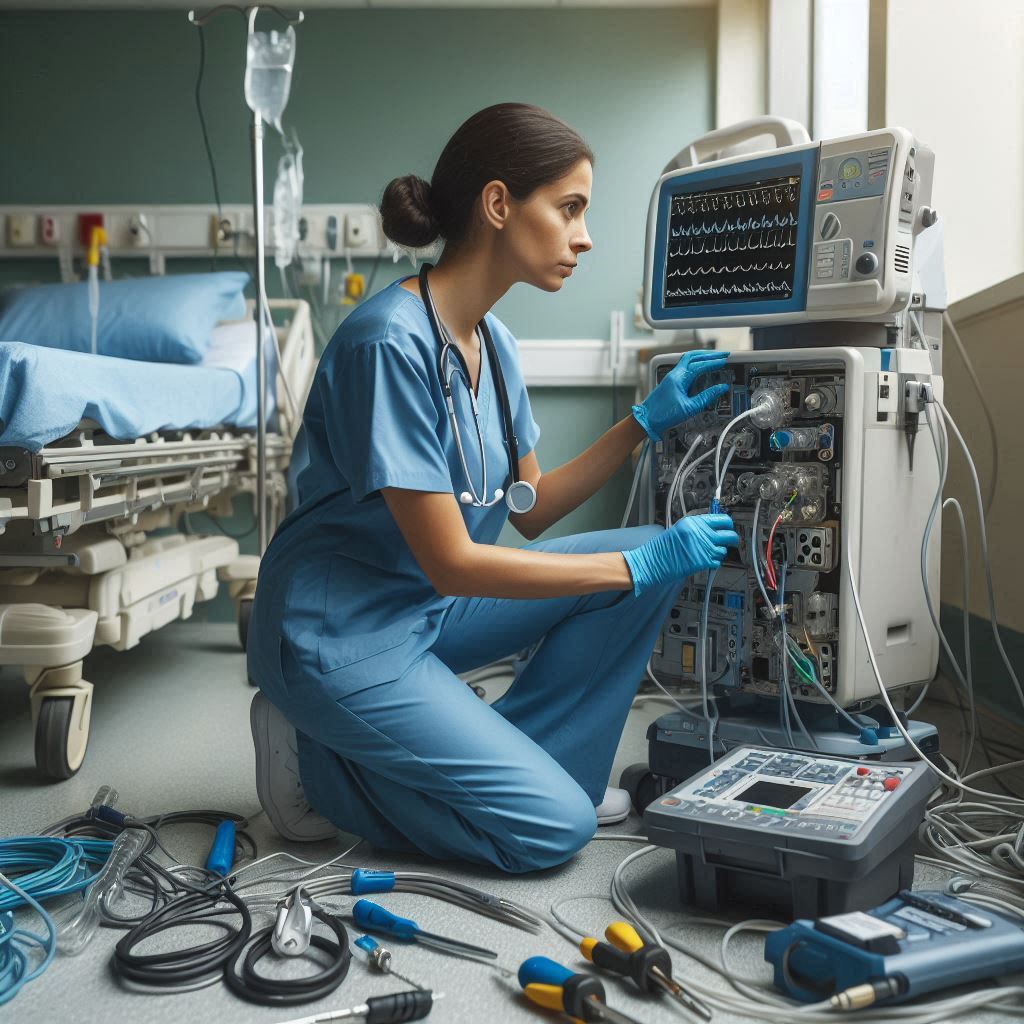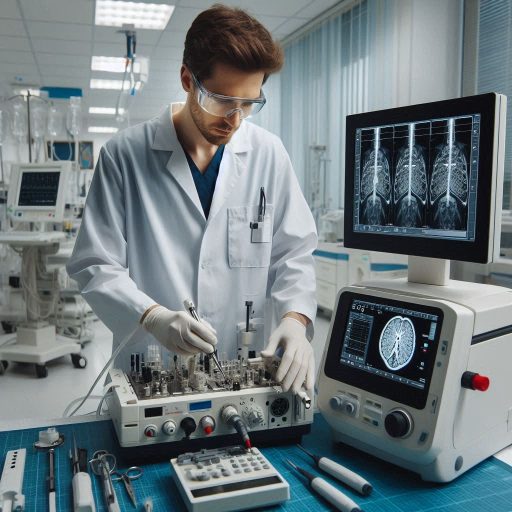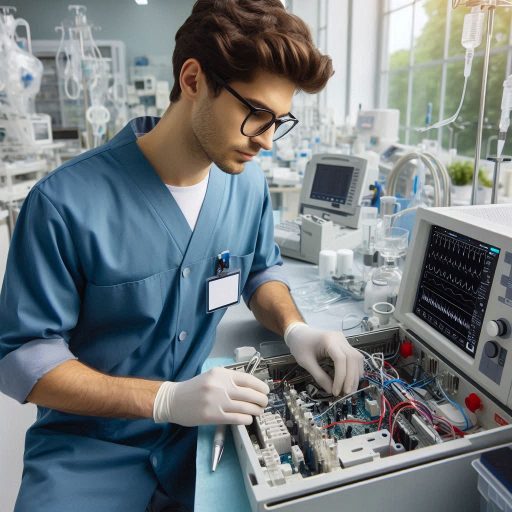Introduction
Interview tips are crucial for aspiring biomedical technicians.
They help you effectively present your skills and qualifications to potential employers.
A successful interview can significantly impact your chances of securing a job in this competitive field.
Preparing for the interview involves understanding the job requirements and the company‘s needs.
Research common interview questions for biomedical technicians and practice your responses.
Highlight your technical skills, problem-solving abilities, and hands-on experience with medical equipment.
Demonstrating your familiarity with industry standards and safety protocols is essential.
Additionally, dress professionally and arrive on time.
These practices show respect and punctuality, which are vital in the healthcare sector.
During the interview, communicate clearly and confidently.
Use specific examples to illustrate your achievements and how they relate to the job.
Follow up with a thank-you email after the interview.
Express appreciation for the opportunity and reiterate your interest in the position.
By following these tips, you increase your chances of making a positive impression and securing a job as a biomedical technician.
Effective interviewing can turn opportunities into offers and set the stage for a successful career.
Research the Company
Importance of Researching the Company Before the Interview
Researching the company before your interview is crucial for making a positive impression.
It demonstrates your genuine interest in the role and the organization.
Understanding the company‘s mission, values, and recent achievements shows you are well-prepared and enthusiastic.
It helps you tailor your responses to align with the company‘s goals and culture.
This preparation also enables you to ask insightful questions, highlighting your proactive approach.
Employers appreciate candidates who take the time to learn about the company, as it indicates a higher level of engagement and commitment.
How to Find Information About the Company Online
Finding information about a company online is straightforward with a few key resources.
Start by visiting the company‘s official website.
Review the ‘About Us‘ section to learn about their mission, values, and history.
Check the ‘News‘ or ‘Press Release‘ section for recent updates and achievements.
LinkedIn is another valuable resource; explore the company‘s page to see updates, posts, and employee profiles.
Industry news websites and trade publications can provide additional insights into the company‘s market position and industry trends.
Review employee reviews on sites like Glassdoor to understand the company culture and work environment.
How to Use the Information in the Interview to Show Your Interest and Knowledge
Utilize the information you‘ve gathered to make a strong impression during the interview.
Mention specific details about the company‘s mission or recent achievements to demonstrate your knowledge.
Relate your skills and experiences to the company‘s projects or goals.
For instance, if the company recently launched a new medical device, discuss how your background aligns with that product‘s needs.
Ask questions about the company‘s future plans or recent initiatives, showing that you are forward-thinking and interested in their direction.
By referencing your research, you convey that you are not only well-prepared but also genuinely interested in contributing to their success.
Researching the company before your interview is essential for making a positive impact.
Use the company‘s website, LinkedIn, industry news, and employee reviews to gather relevant information.
Incorporate this knowledge into your interview responses and questions to show your genuine interest and preparedness.
This approach not only helps you stand out but also demonstrates your commitment to becoming a valuable member of their team.
Understand the Job Description
Why it is important to fully understand the job description
Understanding the job description is crucial for a successful interview as a Biomedical Equipment Technician.
It provides insight into the skills and qualifications required for the role.
Carefully read the description to identify key responsibilities and necessary qualifications.
Highlight specific technical skills, educational requirements, and any experience related to medical equipment.
Understanding these details allows you to prepare relevant examples that align with the job‘s demands.
By grasping the job description, you can address how your background fits with the employer‘s needs effectively.
Matching Your Skills and Experience
Matching your skills and experience to the job requirements is essential for making a strong impression.
Begin by reviewing your resume and noting your relevant skills.
Compare these skills with those listed in the job description.
Identify experiences that directly relate to the job‘s responsibilities.
For instance, if the role requires expertise in maintenance of specific medical devices, highlight your hands-on experience with those devices.
Use specific examples from your past roles to demonstrate how your skills match the job requirements.
This approach shows that you are well-prepared and fit for the role.
Understanding the job description, matching your skills and experience, and tailoring your answers are key to acing an interview for a Biomedical Equipment Technician position.
Thoroughly review the job description to identify essential qualifications and responsibilities.
Align your skills and experiences with these requirements to show that you are a perfect fit.
Tailor your answers to reflect the job‘s needs and highlight your relevant achievements.
By following these tips, you will present yourself as a well-prepared and qualified candidate for the role.
Tailoring Your Answers
Tailoring your answers during the interview can significantly enhance your chances of success.
Focus on aligning your responses with the job requirements and company‘s values.
Start by incorporating keywords from the job description into your answers.
This shows that you understand the role and are familiar with the company‘s needs.
When discussing your qualifications, provide specific examples that demonstrate your expertise in areas mentioned in the job description.
For example, if the role emphasizes teamwork, describe how you effectively collaborated with others on similar projects.
Tailor your answers to highlight your relevant achievements and problem-solving abilities, emphasizing how they align with the employer‘s expectations.
Read: Impact of Drones on Surveying and Mapping
Practice Common Interview Questions
List of Common Interview Questions for Biomedical Technician Positions
When preparing for a biomedical technician interview, anticipate questions about both technical skills and personal attributes. Expect questions like:
- ‘Can you describe your experience with specific medical devices?‘ This question assesses your hands-on experience with relevant equipment.
- ‘How do you troubleshoot a malfunctioning medical device?‘ This evaluates your problem-solving skills and knowledge of diagnostic procedures.
- ‘What safety protocols do you follow when working with medical equipment?‘ The interviewer wants to know about your commitment to safety and compliance.
- ‘Can you give an example of a time you resolved a challenging technical issue?‘ This question looks for evidence of your problem-solving and critical-thinking abilities.
- ‘How do you stay updated with the latest biomedical technology?‘ This tests your commitment to continuous learning and professional development.
- ‘How do you prioritize your tasks when managing multiple equipment issues?‘ The interviewer assesses your organizational and time-management skills.
Tips on How to Answer These Questions Effectively
Answering interview questions effectively involves a few key strategies.
Begin by preparing specific examples that highlight your skills and experiences.
Use the STAR method‘Situation, Task, Action, Result‘to structure your responses clearly.
For technical questions, describe your hands-on experience with medical devices and detail your troubleshooting process.
Be specific about the tools and techniques you use.
When discussing safety protocols, emphasize your understanding of regulations and your commitment to following them meticulously.
For behavioral questions, use examples that demonstrate your problem-solving abilities and teamwork skills.
Highlight situations where you successfully resolved issues or improved processes.
Ensure your answers reflect your dedication to staying updated with industry advancements, showing that you engage in ongoing learning and professional growth.
Practice concise and focused responses to avoid rambling.
Maintain a professional tone and demonstrate confidence in your abilities.
Always connect your answers to how they benefit the employer or improve patient care.
Importance of Practicing Responses with a Mock Interview or in Front of a Mirror
Practicing your responses is crucial for a successful interview.
Conducting mock interviews can help you refine your answers and improve your delivery.
Enlist a friend or mentor to simulate an interview environment.
This practice provides valuable feedback and helps you become more comfortable with answering questions under pressure.
Practicing in front of a mirror allows you to observe your body language and refine your presentation skills.
Pay attention to your facial expressions, posture, and gestures.
Ensuring you project confidence and professionalism through both your words and body language can make a significant difference in your interview performance.
Read: Top Surveying and Mapping Technician Employers
Showcase Technical Skills
Ways to Demonstrate Technical Skills During the Interview
Demonstrating technical skills during an interview can set you apart from other candidates.
Start by discussing your hands-on experience with various medical devices.
Explain how you have used diagnostic tools, like oscilloscopes or multimeters, to troubleshoot issues.
Provide examples of specific equipment you have worked on, detailing the problems you solved.
Be prepared to answer technical questions related to the equipment and software used in the field.
Interviewers often ask about your familiarity with specific technologies or scenarios.
Show your proficiency by describing how you managed similar situations in previous roles.
Consider bringing a portfolio of your work to the interview.
Include reports, calibration records, and any relevant project summaries.
This tangible evidence showcases your technical skills and attention to detail.
If possible, demonstrate your problem-solving abilities by discussing a challenging issue and how you resolved it.
Importance of Providing Specific Examples of Past Experiences
Providing specific examples of past experiences is crucial for demonstrating your qualifications.
Talk about particular projects or tasks where you made a significant impact.
Describe the situation, the actions you took, and the results you achieved.
This approach helps interviewers understand your problem-solving skills and your ability to handle real-world challenges.
Use the STAR method (Situation, Task, Action, Result) to structure your responses.
For example, explain a time when you successfully repaired a complex piece of equipment.
Detail the situation, your role in addressing the issue, and the positive outcome of your actions.
Specific examples make your experiences more relatable and credible.
They also highlight your practical skills and achievements, which can differentiate you from other candidates.
Transform Your Career Today
Unlock a personalized career strategy that drives real results. Get tailored advice and a roadmap designed just for you.
Start NowHow to Highlight Relevant Certifications or Training Programs
Highlighting relevant certifications and training programs can significantly boost your interview performance.
Begin by mentioning any certifications you have, such as Certified Biomedical Equipment Technician (CBET) or specialized credentials.
Explain how these certifications demonstrate your commitment to the profession and your expertise in specific areas.
Discuss any training programs or workshops you have completed that are relevant to the role.
This may include courses on the latest technologies or advanced diagnostic techniques.
Mention how these programs have prepared you to handle current industry standards and practices.
Provide examples of how your certifications and training have directly benefited your previous roles.
For instance, explain how your knowledge from a recent course helped you troubleshoot a complex issue effectively.
This approach illustrates the practical value of your qualifications and shows that you are well-prepared for the role.
Read: Safety Tips for Field Surveying Technicians

Highlight Soft Skills
Importance of Highlighting Soft Skills
In interviews for biomedical technician roles, emphasizing soft skills like communication and problem-solving is crucial.
While technical skills are essential, soft skills often distinguish candidates.
Effective communication ensures you can relay complex information clearly to medical staff.
Strong problem-solving abilities demonstrate your capacity to handle unexpected issues swiftly.
Both skills are critical in a role where clear, timely responses can affect patient care.
Examples of Showcasing Soft Skills During the Interview
To showcase your communication skills, describe instances where you successfully explained technical concepts to non-technical staff.
For example, you might recount a situation where you trained hospital staff on using new equipment.
Highlight how your clear explanations improved their understanding and usage of the devices.
For problem-solving abilities, provide examples of challenging repair situations and how you resolved them.
Explain a time when you diagnosed and fixed a malfunctioning machine under pressure.
Detail the steps you took, from identifying the issue to implementing a solution.
Use specific examples to illustrate your methodical approach and critical thinking.
Connecting Soft Skills to Job Requirements
When connecting soft skills to the biomedical technician role, link them to job responsibilities.
Biomedical technicians must communicate effectively with medical professionals and patients to ensure proper equipment usage.
Illustrate how your communication skills helped in troubleshooting and training scenarios, emphasizing your ability to work collaboratively.
Similarly, relate problem-solving skills to the job’s demands for maintaining and repairing medical equipment.
Explain how your problem-solving skills enable you to diagnose and address issues promptly, ensuring minimal downtime.
This connection highlights your readiness to handle the challenges specific to the role.
Demonstrating these skills during the interview shows that you not only possess technical expertise but also the interpersonal and cognitive abilities needed for the job.
By aligning your soft skills with the role‘s requirements, you present yourself as a well-rounded candidate.
This approach increases your chances of making a lasting impression and securing the position.
Read: Surveying and Mapping Technician Internships: A Guide
Ask Questions
Importance of Preparing Questions to Ask the Interviewer
Preparing questions for your interview is essential.
It shows you are genuinely interested in the position and the company.
Asking questions helps you understand the role better and demonstrates your enthusiasm.
It also allows you to assess if the job aligns with your career goals.
Examples of Insightful Questions
Start by exploring the company‘s culture.
Ask, ‘Can you describe the team dynamics and company culture?‘ This question helps you gauge the work environment and how you might fit in.
Inquire about the role‘s key responsibilities.
Ask, ‘What are the main challenges someone in this position would face?‘ This reveals your interest in understanding what the job entails and preparing for potential obstacles.
Learn about the company‘s goals.
‘What are the company‘s objectives for the next year?‘ This shows you are interested in the company‘s future and how your role contributes to its success.
Understand Training and Development Opportunities
Ask about professional growth opportunities.
‘What types of training or professional development does the company offer?‘.
This question indicates that you are keen on continuous learning and improving your skills.
Explore Performance Expectations
Understanding how performance is evaluated is crucial. Ask, ‘What criteria are used to measure success in this role?‘.
This shows you are serious about meeting expectations and contributing effectively.
Inquire About Equipment and Technology
Ask about the company‘s technology.
‘What biomedical equipment does the company use?‘ This question helps you determine if your experience aligns with their needs.
Ask about future technology plans.
‘Are there any upcoming technologies or upgrades planned for the equipment?‘ .
This indicates you are forward-thinking and ready to adapt to new advancements.
Career Advancement Opportunities
Show interest in long-term growth.
‘What are the typical career paths for someone in this position?‘ This question demonstrates that you are considering a future.
Show Enthusiasm for the Company
Ask about the company‘s industry impact.
‘How does the company stay ahead of industry trends and advancements?‘ This shows that you are engaged and proactive about industry developments.
Transform Your LinkedIn into a Job Magnet
Picture recruiters reaching out to you daily. We craft personalized LinkedIn profiles that stand out, boosting your visibility in ways others can't. Elevate your career now.
Upgrade NowBuild Rapport with the Interviewer
Engage with the interviewer personally.
‘What do you enjoy most about working here?‘ This can build rapport and provide insights into the company‘s work environment from someone currently in the role.
How Asking Questions Demonstrates Interest
Asking well-prepared questions highlights your genuine interest in the position.
It shows you have done your research and are eager to learn more.
Thoughtful questions also reflect your proactive nature and commitment to finding a role that fits your career aspirations.
By preparing insightful questions, you can make a strong impression.
It demonstrates your engagement and helps you gather important information to make an informed decision about the job.
See Related Content: Geotechnical Engineering Projects to Know
Dress and Behave Professionally
Tips on How to Dress Appropriately for a Biomedical Technician Interview
Dressing appropriately for a biomedical technician interview is crucial.
Opt for business professional attire to create a strong first impression.
For men, a tailored suit, dress shirt, and tie are appropriate.
Choose neutral colors like navy or gray for a polished look.
For women, a business suit or a professional dress is ideal.
Pair it with closed-toe shoes and minimal accessories.
Ensure your clothes are clean, pressed, and fit well.
Avoid overly casual attire such as jeans or sneakers.
Dressing professionally demonstrates respect for the interview process and shows that you are serious about the role.
Your attire should reflect your understanding of the professional standards in the biomedical field.
Importance of Body Language and Professional Behavior
Body language plays a significant role in interviews.
Maintain good posture by sitting up straight and leaning slightly forward to show engagement.
Make eye contact with the interviewer to convey confidence and attentiveness.
Avoid crossing your arms, which can appear defensive or disengaged.
Use hand gestures naturally to emphasize points but avoid excessive movements that might distract.
A firm handshake upon greeting sets a positive tone for the interview.
Smile genuinely to create a welcoming atmosphere and display enthusiasm for the position.
Professional behavior extends beyond body language.
Be punctual by arriving at least 10-15 minutes early.
This demonstrates respect for the interviewer‘s time and shows your reliability.
During the interview, listen actively and respond thoughtfully to questions.
Avoid interrupting and be courteous throughout the conversation.
How to Make a Positive First Impression on the Interviewer
Making a positive first impression involves both appearance and demeanor.
Arrive well-groomed and dressed in professional attire to set a confident tone.
Greet the interviewer with a friendly smile and a firm handshake.
Introduce yourself clearly and express your appreciation for the opportunity.
Prepare a brief, engaging introduction that highlights your relevant skills and experiences.
This initial pitch should be concise and focused, showing that you are well-prepared.
Demonstrating enthusiasm for the role and the company can make a lasting impression.
During the interview, project confidence and professionalism.
Speak clearly and avoid using filler words.
Answer questions thoroughly, providing specific examples to showcase your qualifications.
Show that you are both competent and a good fit for the team.
By dressing appropriately, exhibiting positive body language, and behaving professionally, you create a favorable impression.
These elements contribute significantly to how you are perceived by the interviewer.
A strong first impression can set you apart from other candidates and improve your chances of securing the biomedical technician position.
Follow Up After the Interview
Importance of Sending a Thank-You Email After the Interview
Sending a thank-you email after your interview is essential for leaving a positive impression.
It shows your professionalism and appreciation for the opportunity.
A well-crafted thank-you email reinforces your interest in the position and the company.
It provides a chance to briefly recap your qualifications and how they align with the job.
This follow-up can set you apart from other candidates and keep you top of mind for the employer.
How to Express Gratitude and Reiterate Interest in the Position
Start your thank-you email by expressing genuine gratitude for the interview opportunity.
Thank the interviewer for their time and consideration.
Mention specific aspects of the interview that you enjoyed or found particularly engaging.
Reiterate your enthusiasm for the position and how your skills align with the company’s needs.
Briefly summarize why you believe you are a good fit for the role.
Emphasize your eagerness to contribute to the team and the company’s goals.
End the email by expressing your anticipation of the next steps and your willingness to provide any additional information if needed.
Tips on How to Follow Up if You Haven’t Heard Back from the Employer
If you haven’t heard back from the employer within the expected timeframe, a polite follow-up email is appropriate.
Wait at least one to two weeks before reaching out, unless otherwise specified.
In your follow-up email, express your continued interest in the position.
Politely inquire about the status of your application and if there are any updates.
Mention that you are eager to contribute and would appreciate any feedback or information regarding the hiring timeline.
Keep your tone positive and professional.
This follow-up demonstrates your proactive approach and continued enthusiasm for the role.
Sending a thank-you email after an interview is crucial for expressing gratitude and reiterating interest in the position.
Use the email to highlight key points from the interview and reaffirm your fit for the role.
If you haven‘t received a response within the expected timeframe, follow up with a polite and professional inquiry.
This approach shows your ongoing interest and keeps you engaged in the hiring process.
Conclusion
To excel in an interview for a biomedical technician role, start by thoroughly researching the company and its equipment.
Practice common interview questions related to biomedical technology and troubleshooting scenarios.
Highlight your hands-on experience with medical devices and technical skills.
Showcase your problem-solving abilities and attention to detail.
Prepare examples of how you‘ve successfully handled challenging repairs or maintenance tasks.
Dress professionally and arrive on time to make a strong first impression.
Bring copies of your resume and relevant certifications to the interview.
Demonstrate enthusiasm for the role and the field by discussing recent industry trends or advancements.
Use clear and concise language to explain complex technical concepts.
Emphasize your ability to work both independently and as part of a team.
Follow up with a thank-you note to express appreciation for the opportunity.
Remember, interviews are your chance to showcase your skills and qualifications.
Preparation and practice are key to boosting your confidence and improving your chances of success.
Approach each interview as an opportunity to prove your suitability for the role and your dedication to the profession.





This is awesome, Thank you.
You’re most welcome.